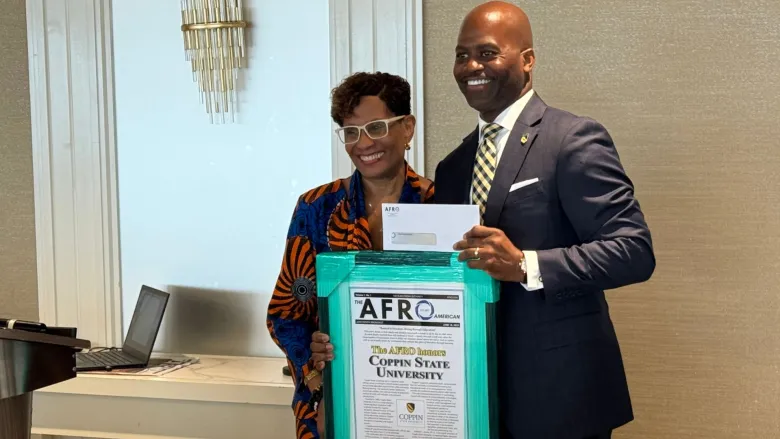The AFRO hosted its third annual Juneteenth Breakfast June 18, honoring Maryland’s historically Black colleges and universities (HBCUs) and celebrating their commitment to educational excellence.
Held at the Center Club in Baltimore, the event brought together student, alumni, faculty and leaders from Morgan State University, Bowie State University, Coppin State University, University of Maryland Eastern Shore (UMES) and the University of Baltimore, a federally designated predominantly Black institution (PBI).
“Rooted in Freedom, Rising Through Education” served as the theme for this year’s breakfast, a reminder that HBCUs continue to be the springboards for growth and leadership for the Black community.
Morgan State University President David K. Wilson spoke passionately about the important role that education has played in building and supporting Black America, especially the work of HBCUs.
“Education is foundational to Black progress in this country. It is because of education—because of the existence of HBCUs—that the Black middle class in America came into existence,” said Wilson. “So it starts with education, and education has led to economic prosperity and empowerment.”
During the breakfast, Wilson and his fellow presidents from Coppin State University, Bowie State University, University of Baltimore and UMES, received a commemorative gift from the AFRO and recognition of their leadership and ongoing contributions to higher education.
“One thing that AFRO has historically done and continues to do is to celebrate Black excellence and to lift up our institutions and the people who run them and the people who support them,” said Rev. Frances “Toni” Draper, CEO and publisher of AFRO.. “Because if the AFRO doesn’t tell the story, usually it doesn’t get told at the same level. And so it’s important to celebrate these HBCUs.”
As much as the breakfast honored the legacy and continuing impact of HBCUs, it was equally a space for reflecting on Juneteenth, a day that still echoes in today’s conversation about freedom and progress.
The holiday traces its roots to Galveston, Texas, on June 19, 1865, when Union troops announced freedom to more than 250,000 enslaved African Americans. Though 160 years have passed, it still holds deep meaning for those gathered at the breakfast.
For Allen R. Taylor, president and CEO of Taylor Made Transportation Services, Juneteenth represents resilience and progress in the face of hardship.
“Juneteenth is a stride that we need to understand that Blacks are able to achieve what we need to…during any type of adversity,” said Taylor. ”We will strive, we will create, we will continue to do what our ancestors did with less, but we need to achieve more. So it’s a stamp to let the world know that Blacks are here to stay.”
The call to remember Juneteenth was echoed throughout the event, including Draper underscoring the importance of commemorating defining moments in Black history.
“We don’t tell the story, if we don’t remember,” said Draper. “We don’t mark the time and the date and the place. We don’t do that, it’s like ignoring your birthday. We celebrate all kinds of things, but we need to celebrate this so we can pass it on, as the Bible says, to generations following.”

